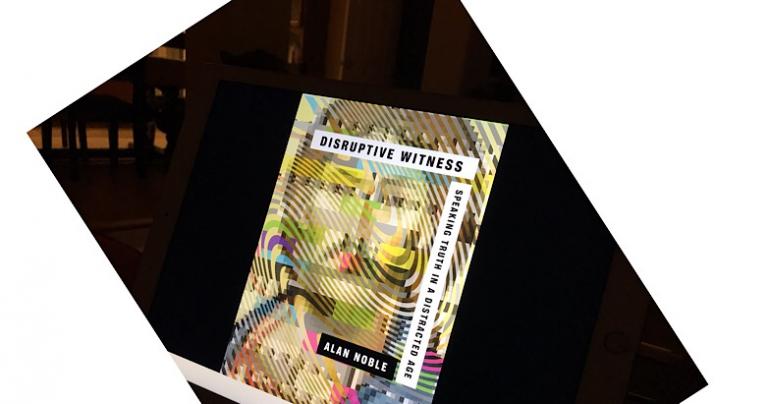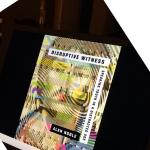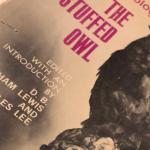
Times are tough for everyone, but what if:
Our faith has the resources to overcome the challenges of our times, but the church has often left those resources untapped.
Professor Alan Noble has written Disruptive Witness, a must-read book. What he calls “secularism” and “distraction” threatens to prevent us from becoming whole and from talking to each other, comprehensibly witnessing in Christian terms.
I am still unpersuaded that Noble’s use of “secularism” is useful, when “badly educated” or “mentally lazy” might better describe the phenomenon he outlines. He might also be describing a state of mind of a mostly white (though it wishes it were not), highly credentialed (not to be confused with thoughtful) elite, in Western parts of the world and less a picture of a global reality where secularism is fading and forms of charismatic religion are growing. People like me may live in an immanent frame, but many of my friends do not.
Thank God.
None of these concerns should keep anyone from reading this book. The illness of the Western world’s academic elites spread everywhere and Professor Noble unpacks them well. Nor should this be taken as a defense of any establishment on the right. Everyone’s house has the pox, including my own.
On distraction, Noble speaks the truth. Distraction keeps us from leaving our tribes, our lazy answers, because we can go on believing lies that are repeated by the carefully culled list of people we follow on social media.
Obviously, this is not to look to some past ‘Golden Age’ when things were better. No moral person, certainly no Christian, looks back before social media and would restore things as they were, even if this were possible.
A Good and Beautiful Burden
We must learn to think well, accept authority where we have no expertise, and take time to be quiet. Bluntly, one result of reading Alan Noble may be for me to close my Facebook and Twitter feeds.
As a depressive, they were always hard for me, but reading Professor Noble reminds me of how much time they waste. Yet there is also learning discipline and that would be better. . . Still, Noble challenges my particular behavior, not yours!
Professor Noble gets the deep truth of Plato’s Symposium: romance, the divine, absolute splendor of being alive and in love with all that is good, true, and beautiful is a weight: a weight of glory.
This is the burden of being. It’s only a burden because it is irreducibly beautiful and good. It forces the question: Why me? What can possibly explain the incredible splendor of my existence? How can we understand this goodness in light of the horrors and sufferings in this world?
Noble pauses where CS Lewis preached to wonder at the burden of the weight of glory. I sat in a quiet monastery, in a Georgian summer, with honey on bread made by the monks and nuns, and talked to good men. My wife Hope was next to me with dear friends and it was good. What is to be made of such civilized times?
Who can say?
This much is true: secularists had thrown the last head (but one) of the community to his death off the beautiful cliffs next to us. Our feast on words and food was beauty responding to the beauty of his sacrifice. Ugliness cannot win. That is a great burden.
How could we see such beauty on a Georgian night, far from home yet at home? I know I am unfit for such beauty, but beauty comes regardless.
Thank God.
Reasons to Believe in Beauty
Professor Noble sees that we need a reason for beauty, an explanation in the face of meaning. I am often asked about the meaningless of the universe, but the harder problem is the deep, pervasive, meaning in the cosmos that demands an explanation. Why should beauty, piercing beauty, come to us?
Noble rightly sees “existentialism” as an attractive option for moderns. We will impose meaning on the meaningless. Our experience makes the mindless matter meaningful.
The problem is that this is a lie.
When we are pierced by the sweetness of the honey on bread at twilight as nuns sing, we are not imposing anything on reality. Reality is pressing down on us with beauty. I am unfit, ill-formed for beauty, but beauty presses down on me because the cosmos contains gratuitous beauty.
Noble is right to say that society sends me on a quest for authenticity. Wisdom sends me on a quest to know myself. These are utterly different adventures. Society wants me to be my true self, philosophy demands I be as I should be.
A self is, in fact, made up of so many different qualities that it is impossible to truly, thoroughly know ourselves.
That is the joy of having eternity for this quest! Nobody should wish to remain what we are, but to become what we should be. Noble, to his infinite credit, affirms this dangerous truth. It got Socrates killed, so we can only hope that Noble has tenure! No faculty member with tenure has yet been given hemlock.
The Gospel’s Never Ending Story
Professor Noble is brave enough to point out that most of the values of the academic culture we both rightly love have become indefensible. We go on doing what we do (and that is a good) because we have always done so. It is here that Noble asserts:
As Christianity has ceased to offer the vision of fullness shared by the vast majority of people in the West, in its place we find billions of micro-narratives of fullness.
I dissent. Christianity continues to offer a vision of fullness in the West, just not overtly. There are no new stories, just Christianity without sexual morals, Christianity without Christ, Christianity without the Bible. . . But always—see Joss Whedon—the Christian story of creation, fall, redemption, and glory.
All the bad myths in the West look to me like Christian stories told by idiots. When I was a boy, for example, I thought to tell a tale of a brave lad who would destroy a cursed object—a bracelet. I didn’t yet realize, in sixth grade, that Tolkien had already told this story.
Most of the stories we tell are the Gospel for degenerates. I am curious as to what Noble would say to this. . . A generalization that invites the sort of nuance that is Professor Noble’s best calling!
I do have one quibble. Professor Noble says:
The quest for the platonic form of yourself deep inside you leads to self-deception, autonomous creation, or despair.
He is quite right to warn us against this, very wrong to call this Platonic. The form, for Plato, must be external: to know yourself is to know you are not such a much. We are not as we should be compared to an external standard. To look within to the roiling, changing desires for what is and call that Platonic is exactly wrong.
Professor Noble is brave in conclusion:
A disruptive witness denies the entire contemporary project of treating faith as a preference.
Buy the book.
_______________________
Alan Noble is the “co-founder and editor in chief of Christ and Pop Culture.” If you are not reading Christ and Pop Culture and you are interested in Christ and/or Pop Culture, then bad. Go and subscribe.
I am slow-reading his new book. Part 1, Part 2, Part 3, Part 4,
Rachel Motte edited this essay and added the sub-headings.












